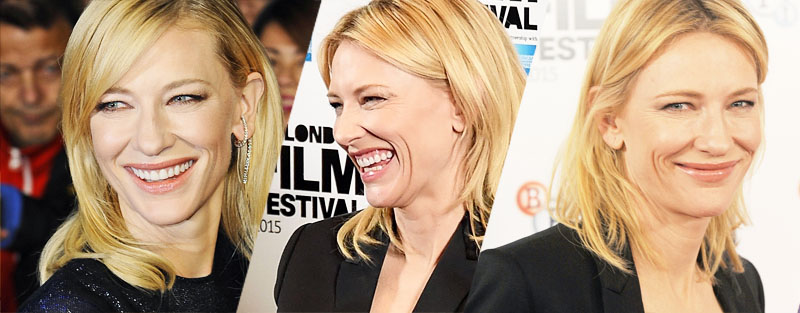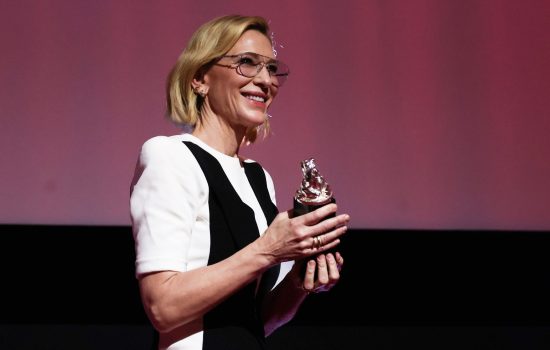















“You know when you go to a great dinner party – the food can be wonderful but it’s the thing that you remember least if the company and conversation is amazing.” Twice-Oscar winning actress Cate Blanchett’s brow furrowed momentarily as she contemplated the question of how she goes about choosing which projects to pursue. “That is the best way I can think to describe it,” she continued. “In a way the role is the last point of entry for me. It’s always first about who I’ll be working with.”
In her career to date, which she describes as “lucky, so very lucky”, the line-up of Blanchett’s co-stars and directors reads as a who’s who of Hollywood’s most renowned – from Woody Allen to Robert Redford, George Clooney to Judi Dench – with her roles spanning royalty, fairy-tale characters, a socialite, a teacher, a Soviet agent, a Disney snake (Jungle Book: Origins is currently filming), Katharine Hepburn and Bob Dylan, to name only a few. However, not one to rest on her laurels, she was thoughtful about what she would like to do next.
“Oh! So many things. I’d love to play Lucy in the musical You’re A Good Man Charlie Brown,” she laughed, “And I would love to work with Jenna Rowlands, Jane Fonda, Amy Adams, Andrea Arnold. They’re all such strong and interesting women.”
So, with such an impressive CV to her name, does Blanchett ever still get star struck? “I worked with Bob Redford recently on a Jamie Vanderbilt film called Truth and I said to Jamie when Bob showed up, ‘What do I call him?’ He was about to come into the trailer and I was like ‘What do I call him? Do I call him Mr Redford? Do I call him Bob? I can’t call him Bob, that’s his nickname! Shall I call him Robert?'” she acted out in mock panic. “Then he came in, stuck out his hand and said,’Bob Redford’ and I thought ‘Ok, that’s what I’ll go with.’ He’s had such a profound effect on American culture and has a deep-seated curiosity about what makes the world tick that’s as alive in him today as it was 50 years ago. He’s thrilling to be around. He’s a facilitator of talent, which is such an incredible achievement.”
Aside from the script and the company, there is something – or rather four somethings – that now play an even more vital role in Blanchett’s career choices. “I mean, it’s also – sorry to be so prosaic – having four children and a partner who is working, it’s a balancing act. So often it’s, ‘Is this happening in the school holidays?” You can’t do everything,” she told us. “By devoting yourself to one project you think, ‘Oh I can’t do that, I can’t see that, I missed this.’ There is always that fear of missing out.”
Another decision that Blanchett has found herself having to make in her professional life is how, and whether, to utilise her prominence for philanthropic purposes. “If you have a certain amount of airtime, you can use that space to talk about something worthwhile or you can use it to release your own clothing line and a reality television show based on your own life,” she mused. Having recently returned from a UN trip to Lebanon to meet with refugees displaced by the current crisis, her choice is evident. “You do have to be quite judicious about what you say though, because of the way it gets digested by the media and the conversation can be hijacked. The issues have to remain the most important element.”
No matter the topic, Blanchett takes the same measured approach to each answer, visibly thinking out every question – particularly when she is discussing her work and the characters, who she describes as if they are old acquaintances, that she has played. Her latest venture, the title role in Todd Haynes’s lesbian romance Carol is no different. The film, which possesses all the elements of a traditional love story – the chase, the passion, the heartbreak – is based on Patricia Highsmith’s 1952 novel The Price Of Salt, the genre of which was so controversial at the time – it was printed the very year, in fact, that the American Psychiatric Association classified homosexuality as a mental disorder – that the author chose to publish it under a pseudonym.
The compellingly subtle way in which story unfolds onscreen is an element that Blanchett credits Haynes with, but the triumph does not only belong to the director. A masterpiece so rich in atmosphere and emotion requires a myriad of complementing elements to carry weight and for a film that Blanchett describes as “fast and furious – we didn’t have a lot of time or money,” it has a beguilingly measured pace. Tension – from erotic to spine-chilling – builds in the lingering camera shots and Blanchett’s lasting gaze, for which she is so famed, conveys the most evocative expression with the merest of movements.
“He has made a film that is entirely about the process of falling in love – the thrills, the anticipation, the eroticism, the longing, the lust and the trepidation. Those volcanic feelings,” she lilted. “And yet the love exists between two women. It’s a vital component in the film but it’s also immaterial.” Material or immaterial, after only 15 minutes with Blanchett, who is already receiving Oscar whispers for the role, it is clear that she is a woman of substance.
via Vogue UK
 Welcome to Cate Blanchett Fan, your prime resource for all things Cate Blanchett. Here you'll find all the latest news, pictures and information. You may know the Academy Award Winner from movies such as Elizabeth, Blue Jasmine, Carol, The Aviator, Lord of The Rings, Thor: Ragnarok, among many others. We hope you enjoy your stay and have fun!
Welcome to Cate Blanchett Fan, your prime resource for all things Cate Blanchett. Here you'll find all the latest news, pictures and information. You may know the Academy Award Winner from movies such as Elizabeth, Blue Jasmine, Carol, The Aviator, Lord of The Rings, Thor: Ragnarok, among many others. We hope you enjoy your stay and have fun! 


 A Manual for Cleaning Women (202?)
A Manual for Cleaning Women (202?) The Seagull (2025)
The Seagull (2025) Bozo Over Roses (2025)
Bozo Over Roses (2025) Black Bag (2025)
Black Bag (2025)  Father Mother Brother Sister (2025)
Father Mother Brother Sister (2025)  Disclaimer (2024)
Disclaimer (2024)  Rumours (2024)
Rumours (2024)  Borderlands (2024)
Borderlands (2024)  The New Boy (2023)
The New Boy (2023) 











